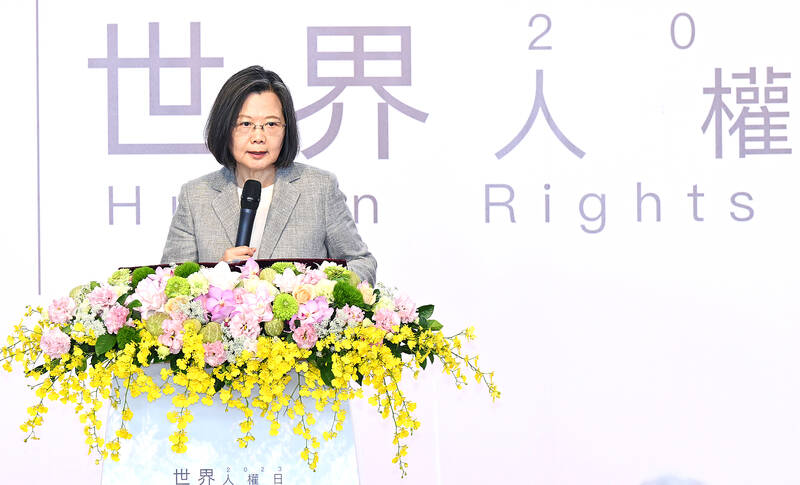The government remains steadfast in its commitment to facilitating transitional justice and preserving the stories of those persecuted during the White Terror era, President Tsai Ing-wen (蔡英文) said yesterday.
“On the path of transitional justice, we will remain steadfast,” Tsai told an event marking Human Rights Day, observed annually on Dec. 10, at the Jing-Mei White Terror Memorial Park in New Taipei City.
Such efforts, especially to raise public awareness of what happened in Taiwan between 1949 and 1992, would help create a freer and more equitable society in which the values of democracy and human rights are protected, she said.

Photo: Liao Chen-huei, Taipei Times
The Tsai administration first pushed for transitional justice in December 2017, when the Act on Promoting Transitional Justice (促進轉型正義條例) was promulgated.
Efforts to carry out transitional justice have included investigating cases of political persecution and determining whether the victims in those cases should be exonerated or compensated, or both.
The government has also preserved sites where state wrongdoings occurred, such as the Jing-Mei White Terror Memorial Park, which was a detention center, Tsai said, adding that it has promoted the teaching of White Terror history through school curriculums and cultural events.
These efforts aim to give the public an understanding of the harm inflicted by the authoritarian regime on society, while consolidating democracy and the rule of law in Taiwan, she said.
The government had since January confirmed 1,829 compensation claims by White Terror victims, awarding more than NT$3 billion (US$95.62 million) in total, she said.
Many of those cases were processed by the Transitional Justice Commission, which was not authorized to award compensation, and then handed over to a foundation created in January to restore the rights of victims of authoritarian rule.
Retired businessman and former political prisoner Yang Kuo-yu (楊國宇) urged the government to step up efforts to educate young people about the country’s authoritarian past and preserve historical sites of injustice.
The 91-year-old also called for the continued pursuit of the truth about what happened during the White Terror period.
Yang was sentenced to 10 years in prison in 1950 at the age of 18, after being falsely accused of “taking part in rebellious groups,” government information showed.
Following his release in 1960, Yang started working in textiles, gradually working his way up in the industry before expanding to other businesses, such as pharmaceuticals and biotechnology.
He was exonerated earlier this year.
Yang was among the former political prisoners recognized at yesterday’s event for donating to the National Human Rights Museum.
He donated to the memorial park a violin that he had throughout his incarceration on Green Island.

Chinese Nationalist Party (KMT) Chairman Eric Chu (朱立倫), spokeswoman Yang Chih-yu (楊智伃) and Legislator Hsieh Lung-chieh (謝龍介) would be summoned by police for questioning for leading an illegal assembly on Thursday evening last week, Minister of the Interior Liu Shyh-fang (劉世芳) said today. The three KMT officials led an assembly outside the Taipei City Prosecutors’ Office, a restricted area where public assembly is not allowed, protesting the questioning of several KMT staff and searches of KMT headquarters and offices in a recall petition forgery case. Chu, Yang and Hsieh are all suspected of contravening the Assembly and Parade Act (集會遊行法) by holding

PRAISE: Japanese visitor Takashi Kubota said the Taiwanese temple architecture images showcased in the AI Art Gallery were the most impressive displays he saw Taiwan does not have an official pavilion at the World Expo in Osaka, Japan, because of its diplomatic predicament, but the government-backed Tech World pavilion is drawing interest with its unique recreations of works by Taiwanese artists. The pavilion features an artificial intelligence (AI)-based art gallery showcasing works of famous Taiwanese artists from the Japanese colonial period using innovative technologies. Among its main simulated displays are Eastern gouache paintings by Chen Chin (陳進), Lin Yu-shan (林玉山) and Kuo Hsueh-hu (郭雪湖), who were the three young Taiwanese painters selected for the East Asian Painting exhibition in 1927. Gouache is a water-based

Taiwan would welcome the return of Honduras as a diplomatic ally if its next president decides to make such a move, Minister of Foreign Affairs Lin Chia-lung (林佳龍) said yesterday. “Of course, we would welcome Honduras if they want to restore diplomatic ties with Taiwan after their elections,” Lin said at a meeting of the legislature’s Foreign Affairs and National Defense Committee, when asked to comment on statements made by two of the three Honduran presidential candidates during the presidential campaign in the Central American country. Taiwan is paying close attention to the region as a whole in the wake of a

OFF-TARGET: More than 30,000 participants were expected to take part in the Games next month, but only 6,550 foreign and 19,400 Taiwanese athletes have registered Taipei city councilors yesterday blasted the organizers of next month’s World Masters Games over sudden timetable and venue changes, which they said have caused thousands of participants to back out of the international sporting event, among other organizational issues. They also cited visa delays and political interference by China as reasons many foreign athletes are requesting refunds for the event, to be held from May 17 to 30. Jointly organized by the Taipei and New Taipei City governments, the games have been rocked by numerous controversies since preparations began in 2020. Taipei City Councilor Lin Yen-feng (林延鳳) said yesterday that new measures by